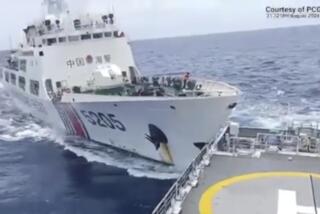DIPLOMACY : Surprise Accord at ASEAN Meeting Could Settle Spat Over Spratly Islands : Non-members Vietnam and China voice support for the six-nation Southeast Asian grouping’s ‘historic’ declaration. Potential oil deposits are at stake.
- Share via
MANILA — Secretary of State James A. Baker III will arrive here today to find that the new world order, at least in Southeast Asia, has started without him.
In its first annual meeting since the end of the Cold War, the six-nation Assn. of Southeast Asian Nations unexpectedly signed its first formal declaration on regional security in hopes of defusing rising tensions in the strategically important, potentially resource-rich South China Sea.
The declaration was aimed at averting an armed confrontation with China over competing claims in the long-disputed Spratly Islands, a scattered chain of 105 half-submerged rocky shoals, sandbars and reefs over a shallow seabed believed to hold large deposits of oil and natural gas.
In recent weeks, China deployed warships and warned it was prepared to use force to defend an agreement it signed in May with the Denver-based Crestone Energy Corp. to explore for oil in 9,700 square miles also claimed by Vietnam. The islands are claimed wholly or in part by China, Vietnam, Malaysia, the Philippines, Brunei and Taiwan. All but Brunei have stationed troops on the islands they occupy.
The ASEAN Declaration on the South China Sea, issued Wednesday at the end of the group’s 25th annual meeting of foreign ministers, urges that competing claims be settled without the use of force. It creates a framework for regional cooperation in maritime navigation, marine pollution, search and rescue missions, plus efforts to combat piracy and illicit drugs.
Vietnam gave its “full support” to the declaration, while China said it would make a “positive” response to it. Earlier, Chinese Foreign Minister Qian Qichen told reporters that China would “shelve the dispute” in favor of “joint development” of the Spratlys. The two countries’ navies last clashed over the islands in 1988.
“I think this will ease the tension,” Malaysian Foreign Minister Abdullah Ahmad Badawi said. “I believe China will heed our feelings.”
A Western diplomat agreed, saying, “I think the ASEAN declaration was a modest but historic step.”
Neither China nor Vietnam is an ASEAN member. But their presence here, as well as that of Russian Foreign Minister Andrei V. Kozyrev, was vivid evidence of the expanding role and new challenge for an organization first formed as a staunch anti-Communist bloc at the height of the Cold War.
This year, China and Russia were invited as “guests,” while Vietnam and Laos signed a treaty making them official “observers,” paving the way for eventual membership in ASEAN for both Communist countries. Such moves were unthinkable several years ago.
At the same time, the U.S. role was diminished by the continuing withdrawal from a nearly century-old presence in the Philippines. Washington insists it will maintain a visible presence in the region through limited military-access agreements. ASEAN has never functioned as a collective military alliance, partly because of the U.S. security umbrella.
“During the Cold War, at least we knew the parameters,” said Philippine Assistant Foreign Secretary Romualdo Ong. “We knew the principal players; we knew the dos and don’ts of the game. Now that the Cold War is gone and there’s a new geopolitical landscape, it is necessary for the countries of the region to review the security situation and maybe take the matter of security more in hand now that there’s no longer the umbrella of the United States.”
ASEAN is now the world’s fastest-growing regional economic grouping and the United States’ third-largest trading partner after Europe and Japan. ASEAN consists of Brunei, Indonesia, Malaysia, the Philippines, Singapore and Thailand. The area is expected to have a $1-trillion economy and a market of 400 million people by the end of the century.
The six nations were to meet this weekend with their seven “dialogue partners,” including the United States, Japan and the European Community. Baker, arriving a day late because of last-minute schedule changes in the Middle East, is making his first visit to the Philippines.
He brings a mixed agenda. He is expected to seek support for military-access agreements and to meet with new Philippine President Fidel V. Ramos in hopes of easing relations.
More to Read
Sign up for Essential California
The most important California stories and recommendations in your inbox every morning.
You may occasionally receive promotional content from the Los Angeles Times.













